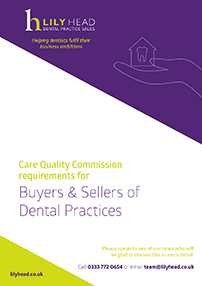Firstly, lets consider what defines market value. By understanding these factors we can more easily see where the opportunities to add value exist.
-
Factors that define market value
Ultimately the marketplace will let you know what it is willing to pay, and as in any commodities market, supply and demand play a significant role.
Dental brokers such as Lily Head Dental Practice Sales influence market values. We do this by helping dentists prepare for sale, creating a competitive bidding process around a dental practice, and negotiating between all interested parties to get the best outcome for the vendor.
The main drivers of market value are:
- Location: region, position, demographics, competition, recruitment opportunity
- Income: streams, stability, regularity, clinician diversity
- Financial performance: profit, revenue, operational costs
- Reputation: longevity, patient reviews, new patient numbers
- Property: freehold, leasehold, tenure and investment
- Patients: demographics and availability of additional patients
- Potential: growth, space and additional services
-
Goodwill
Goodwill is a key component of any valuation. It is the value of the intangible assets reflecting the business as a ‘going concern’ and the certainty that future profit is sustainable, due to continued repeat business.
Buyers want to mitigate the risk of losing goodwill when the current Principal leaves the practice, and this can be done by tying the vendor into the practice for an agreed period. If a departing Principal wishes to gain maximum goodwill value, it’s expected that they do not set up another practice locally in competition.
- Baseline valuation
A baseline valuation is the best educated assessment of what the market might pay for a practice. This valuation is ideally made available to the entire market so that potential deals with the best terms aren’t missed. These could be from corporate buyers, mini corporates, groups and private buyers.
- EBITDA
EBITDA (Earnings Before Interest, Taxes, Depreciation, and Amortization) is a measure of the true operating profitability of a practice.
The baseline valuation is based upon a multiple of the sustainable EBITDA. This therefore provides a clearer indication of your actual earnings. This is needed by the buyer and any finance brokers or lenders involved in the funding of a purchase.
The multiple of EBITDA is determined by considering comparable data for recent sales of similar practices, and the relative strengths and weaknesses of the market drivers listed above (excluding location).
The impact of a change in EBITDA on a practice value is seen as follows:
If the market value of your dental practice is 7 x EBITDA, then an increase or decrease in EBITDA of £20,000 pa will either increase or decrease the value of your dental practice by £140,000.
-
Dental Brokers role
A trusted, UK-wide agent will evaluate your practice and contribute valuable insights to the sale process:
Benchmarking: identifying factors that will influence the value of your practice against its current market activity.
Maximise value: focussing on how to develop your business to maximise value and appeal to buyers.
Support to achieve goals: short term goals to reach the current value and short to medium term goals to meet the projected future valuation.
-
Maximising market value in the immediate run-up to a sale
It is important to maintain a tight control over the operation of your practice in the immediate run-up to a sale as this can influence the final value either positively or negatively:
Tenure: lenders will not fund the purchase of a practice for longer than the buyer has security of tenure, usually 15 years. It’s important to ensure that the tenure of the practice supports the buyer’s funding.
Property/practice condition: ensure potential capital expenditure considerations are minimised for incoming buyers.
Compliance: undertake a compliance audit to ensure that you have actioned recommendations of the last CQC/HIW/HIS/RQIA report and all policies and procedures are up to date. Ensure all NHS contractual requirements are met.
Financial accounts: Up-to-date monthly management accounts are required during a purchase process. Lenders’ due diligence will need to be supported by audited financial information.
Turnover: it’s important to maintain maximum possible turnover in the run up to a transaction.
Plan patients: Ensure the goodwill of your capitation list, by confirming that all of your patients are in the correct fee category, based on their latest risk assessment.
Spending: manage your overall spending to protect your EBITDA. If you have agreed a sale, salary reviews should only be offered in conjunction with the new owners, as it is their money being spent.
-
Maximising value when starting to consider a sale
The location of your practice is the only factor affecting value that you cannot influence. The many ways that you can positively influence the value of your practice should be evidenced and sustainable:
Financials: Know your numbers and have a good handle on your accounts. Lily Head can help you identify opportunities which will make a difference such as reviewing your patient treatment fees.
Patient base: Recall patients who have not attended for a while and grow your plan membership to support the profitability and goodwill value. Identify your ideal client characteristics: geographic, demographic, psychological (how they think, what they need, what they appreciate).
Marketing strategy: Consider ways to attract new patients and market to your existing ones (email, direct mail, social media, open days and website search engine optimisation (SEO). Establish how to convert enquiries into new patients. Compile testimonials from existing patients.
Operations: Review your existing patients’ journey. Investigate opportunities to add further services. Are you turning down patient requests or could you fulfil a local gap in the market for specialist Periodontal services as an example? Consider a business coach to help improve value. Lily Head have recommendations for you.
Productivity: Dig into the data to understand which are your most profitable treatments and whether there’s scope to complete more of them. Analyse your surgery and Associate’s hourly yield. Manage the practice downtime.
Cost Management: Simply reducing your costs whilst maintaining your revenue will increase your profitability. However, under-paying staff or being under-resourced will be questioned by buyers during the due diligence phase.
The following cost controls are recommended, either in conjunction with us, your accountant or a business coach:
- Benchmark your business cost lines to identify opportunities for improvement and start with the biggest costs such as staffing, Associates, materials and labs
- Validate supplier invoices for accuracy
- Know your inventory (avoid over-ordering to compensate for a lack of knowledge)
- Negotiate for bulk discounts where it makes sense and ensure your suppliers do not take you for granted in their pricing strategy.
- Look at the income allocation in your practice.
Governance: Prospective purchasers will always be attracted to well-run businesses which present low process and compliance risks. These are some of the areas to consider:
- IT: consider implementing a support contract and ensure you are using up-to-date anti-virus software
- CQC/HIW/HIS/RQIA: stay up-to-date and evidence that all recommendations have been addressed, with no breach notices
- Record keeping: all up to date
- GDPR: ensure processes around patient and staff confidentiality are in place and there is a general respect throughout the practice
- HR: ensure all processes and Associate agreements are in place and there are no outstanding staff grievances.
Other Considerations: These will generate a return on any time and money you invest:
- Practice: Quality and physical presentation of the practice can impact positively on first impressions and can promote competitive bidding
- Demonstrate your Plan Patients base is up to date.
-
Conclusion
You can accrue a good deal of added value within a reasonable time frame in the lead up to a practice sale. The foundation for the plan is a professional valuation of your business. Combining that with the detail and advice behind it delivers a winning strategy in alignment with your goals and timelines.
It is important not to do this alone. Your trusted advisors should be very clear about delivering a good return for their fees. Make sure they can demonstrate that, and then work together to get the best deal and terms within the transaction.
Any dentist who wishes to further understand the issues raised by this article or the opportunities that exist for them should Contact Us today for an informal discussion.
This article was written by Abi Greenhough, the Managing Director at Lily Head Dental Practice Sales, and first published in The Dentist Magazine in February 2022.
If you would like to talk about anything to do with buying, selling or financing a dental practice anywhere in the UK then Contact Us today.






